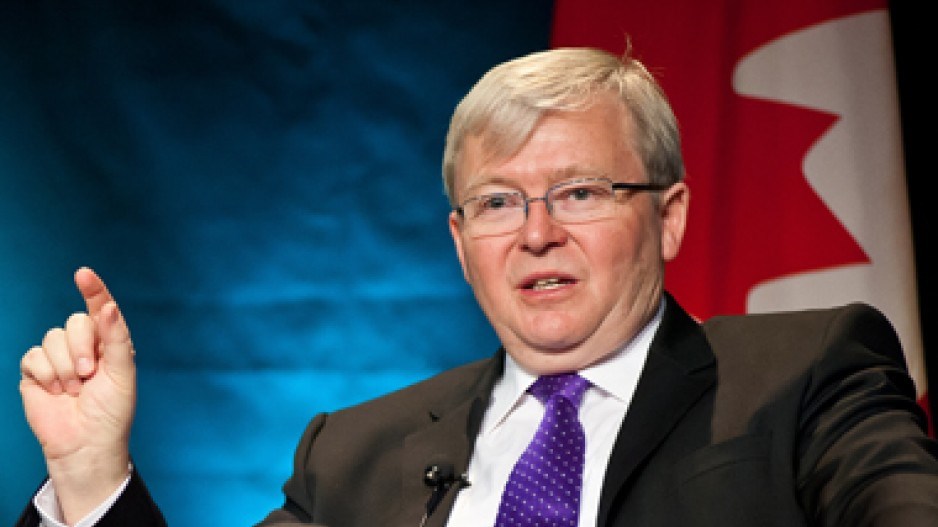B.C. firms should be looking to partner with Australian counterparts rather than seeing them as competitors for Asian business.
That was one of the messages from Kevin Rudd, former prime minister of Australia, who was in Vancouver as the keynote speaker for the first Circle of Prosperity summit organized by the Business Council of BC (BCBC) and the BC Chamber of Commerce.
“These are two large economies; we’re a $1.4 trillion economy; Canada is a $1.6 trillion economy. That’s $3 trillion between us in economic activity. The amount of activity we can engage in together [in Asia] is very, very large,” said Rudd in an interview with Business in Vancouver. “My pitch is for people to look at teaming up with their Australian partners and do stuff together. But we need an adjustment in both country’s business mindsets.”
According to BCStats, trade between B.C. and Australia has remained relatively low over the past decade. Australia accounted for only 1.2% of B.C.’s exports last year, which amounted to $371 million in trade volume. That’s essentially on par with the value of the province’s exports to India ($322 million) and the U.K. ($328 million), but less than the $656 million in trade with Taiwan and $1.9 billion with South Korea.
Over the years, Australian and Canadian firms have eyed each other’s markets for expansion. Since 2007, Australia’s Macquarie Group has made several acquisitions in Canada that have led to the creation of its Canadian wealth management and investment banking arms. And Burnaby telecom retailer Glentel Inc. (TSX:GLN) expanded into the Australian market last year with its $67.7 million acquisition of AMT Group Pty Ltd., Australia’s largest mobile phone retailer.
But Rudd says Canadian-Australian joint ventures exploiting Asian markets could leverage both countries’ strengths. The liquefied natural gas market is a good example. While Australia is decades ahead of Canada in servicing Asia’s demand, Rudd dismissed claims that the market isn’t big enough for both countries.
“They will still need energy. What do countries like Australia and Canada bring to the table? Strong, stable, reliable countries that do projects well, on time, on price with minimal risk.”
But Rudd noted that whatever Asian market B.C. companies want to tap, government needs to have a consistent long-term focus and policy approach.
“It is important ... to engage [Asian] governments with a policy of long-term engagement with their countries and economies, so they don’t just see us as fair-weather friends.”
Rudd credited Australia’s consistent policy of engagement with Asia as one of the keys to the country’s continued economic strength and diplomatic influence.
Most importantly, he suggested the country has evolved over the years to see itself as a part of Asia instead of a Western outsider.
“The drivers of economic growth globally will be increasingly in the Asian hemisphere clear until 2050. For [Australia], this region, once considered foreign and exotic, has now become familiar. There has been no national alternative.”




